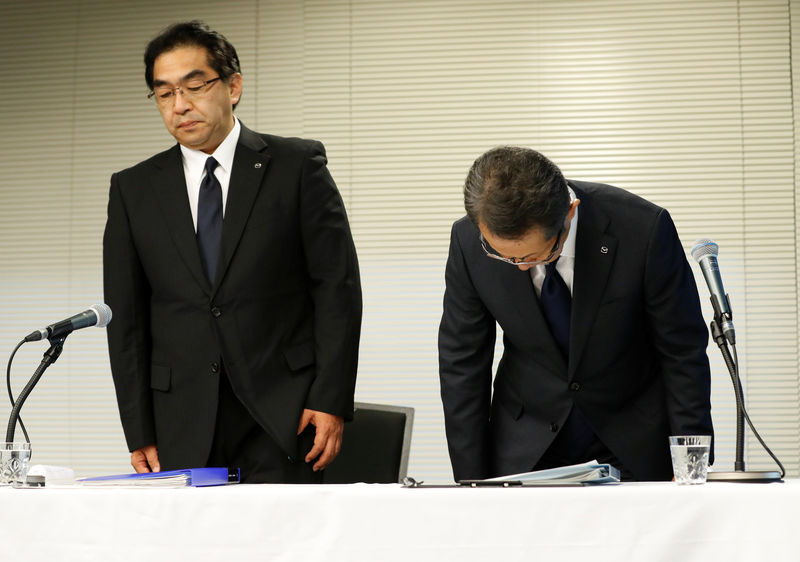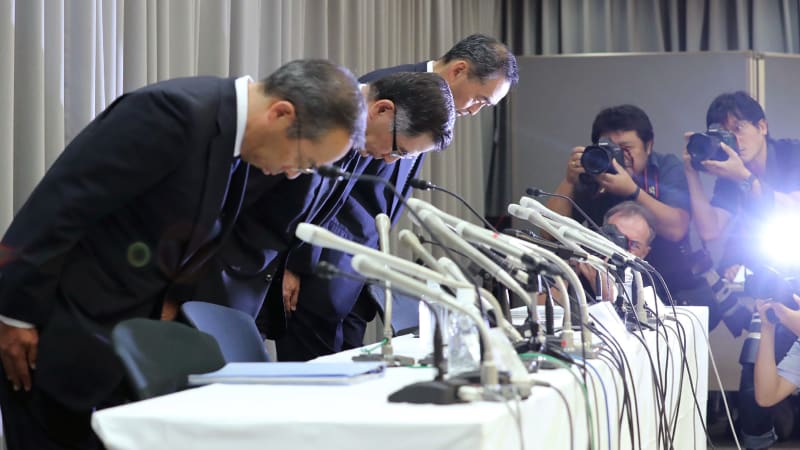Good morning, Q-MHI readers!
WHAT TO WATCH FOR TODAY
Mike Pence outlines plans for a “Space Force.”

The vice president will give details on the proposed new military branch, which Donald Trump suggested in March.
In a speech at the Pentagon on Thursday at 11:15 a.m., Vice President Pence is scheduled to lay out the administration’s plan. The Pentagon is also expected to release a congressionally mandated report on the plan.
But the calls for a separate military branch have been met with strong reluctance in some parts of the Pentagon amid concerns that it doesn’t need the burdens of a new bureaucracy. The move could significantly reorganize the military and potentially strip the Air Force of some of its key responsibilities.
Last year, Defense Secretary Jim Mattis said in a memo to Sen. John McCain (R-Ariz.), chairman of the Senate Armed Services Committee, that he opposed “the creation of a new military service and additional organizational layers at a time when we are focused on reducing overhead and integrating joint warfighting functions.”
On Tuesday, however, Mattis said that military leaders “are in complete alignment with the president’s concern about protecting our assets in space to contribute to our security to our economy and we’re going to have to address it as other countries show a capability to attack those assets.”
Congressional approval would be needed to establish an entirely new military branch. A Space Force, dedicated to space the way the Navy is to the sea, would be the first new military service since the Air Force was created in 1947. But Mattis said that creating a new combatant command for space, such as one that governs the Pentagon’s Special Operations, “is certainly one thing that we can establish.”He added that the plan for how best to implement it was still ongoing: “I don’t have all the final answers yet. We’re still putting it together.”

But the plan to create an entirely new branch of the military has rankled some in the Pentagon, who say it is unnecessary and that the Air Force has for years looked after the nation’s interests in orbit.
This year, Gen. John Hyten, the commander of the U.S. Strategic Command, said that “rather than going through the difficulty of new organizational constructs, I believe the leadership we have now can execute the missions that we need to.”Since then, the White House has continued to press for a Space Force, giving the plan momentum and the weight of the executive branch.“We have the direction from the president, and we’re underway,” Mattis said Tuesday.
It would still need congressional approval, and some lawmakers dislike the idea of creating another government entity.
Viacom reveals its third-quarter results.

Increased competition from Netflix and Amazon have weakened the media network’s hold on the industry, but successful movie openings and a solid international subscriber base could give Viacom a boost.Notably, Viacom beat the Zacks Consensus Estimate in three of the trailing four quarters, with an average positive earnings surprise of 6.36%. In the last reported quarter, the company’s adjusted earnings beat the Zacks Consensus Estimate by 12 cents.
Viacom’s top line also beat the consensus mark in three of the trailing four quarters. In the last reported quarter, revenues came in at $3.15 billion, beating the Zacks Consensus Estimate of $3.04 billion but down 3.3% from the year-ago quarter. Let’s see how things are shaping up prior to this announcement.
Key Factors
Shares of Viacom have lost 4.4% on a year-to-date basis while the industry rose 2.8% over the same period. The decline can be attributed to growing competition from other video-service providers.

However, Viacom’s Paramount Pictures’ release of A Quiet Place in third-quarter fiscal 2018 is expected to contribute to top-line. Notably, A Quiet Place is Paramount’s biggest opener since 2016 and second biggest domestic opener in 2018.
Additionally, the company is expected to benefit from its strong performance on the international front, given the significant room for growth due to lower Pay-TV penetration (40%) compared with the United States (80%).
In the last reported quarter, Viacom’s international revenues increased 18% year over year to $566 million, offsetting domestic revenue decline of 3%.
Dropbox posts earnings.

The cloud services firm, which went public in March in one of the biggest tech IPOs of the year, is expected to report revenues of around $300 million for the latest quarter.Wednesday’s movement reflects investor apathy heading into Thursday’s report. But what should we expect from its soon-to-be-reported quarter? Let’s take a closer look.

Dropbox will release its Q2 fiscal 2018 results after the market closes on Thursday. Here’s what analysts are expecting, according to our Zacks Consensus Estimates:
Earnings: DBX is projected to report earnings of $0.06 per share, which would mark a big shift from last quarter’s ten-cent beat of $2.08 in net loss per share.
Estimate Revisions: The firm hasn’t seen any recent earnings estimate revisions for the current quarter, or any other upcoming period. However, the Zacks Consensus Estimate for this quarter is a cent higher than it was 90 days ago. Moreover, the current fiscal year consensus EPS estimate of $0.28 is also four cents higher than the previous projection.
Revenue: Consensus estimates have DBX’s Q2 revenue pegged at $330.3 million. Investors should note that DBX’s full-year consensus estimate of $1.35 billion would represent 22.2% in year-over-year growth.
WHILE YOU WERE SLEEPING
Argentina rejected a bill to legalize abortion.

After a divisive campaign in Pope Francis’s homeland, the senate voted against legislation that would have allowed abortion into the 14th week of pregnancy. It can’t be resubmitted until 2019.
In May, another largely Catholic country, the Republic of Ireland, voted overwhelmingly in a referendum to overturn a ban on abortion.The global trend has been towards legalisation but the debate continues – in the US, for instance, changes to the Supreme Court has led to speculation abortion could be made illegal in some states.

“This law doesn’t obligate, nor does it recommend anyone have an abortion. The only thing this law does is defend the right to choose.” Norma Durango, from the opposition Peronist party
“The message that we wanted to put across is that abortion equals social failure. For a woman to resort to it, many other things need to have failed first.” Camila Duro of the anti-abortion non-governmental organisation Frente Joven
“Women perform abortions with criminalisation or without it.” Sabrina Cartabia Groba, pro-choice lawyer and campaigner
“Abortion always kills a child and it doesn’t solve the woman’s problem. We believe that this is never the solution. Faced with an unexpected pregnancy abortion is never the solution. There are always other solutions.” Maria Castillo, who campaigned outside parliament
Aldi ramped up the competition in the US.

The German-owned discount supermarket is rolling out more fresh, organic products and easy-to-prepare food to take on its American rivals. Aldi has earmarked $5 billion to expand to 2,500 stores in the US by the end of 2022 from 1,600 in June 2017. . Its small store model keeps prices down and has upended Britain’s grocery market.
A fifth of all products in Aldi stores will be new by early 2019, the company said, adding that it had targeted popular categories including easy-to-prepare food and fresh, organic produce and meat. Aldi said it was halfway through remodelling some of its stores to include more refrigeration space.

Traditional grocers such as Walmart Inc (WMT.N) and Target Corp (TGT.N) have been slashing prices to win back shoppers lost to Amazon.com Inc (AMZN.O) and other e-retailers. Surging commodities and transportation costs are also forcing companies that supply retailers with packaged goods to raise prices. Aldi, whose products are 90 percent private-label, is far less exposed to these rising costs.
“At a time when the rest of the industry is really struggling, Aldi is thriving and investing,” Aldi Chief Executive Jason Hart said in an interview. Regular supermarkets offer too many products, while Aldi’s four- to five-aisle stores help to keep down costs and prices, he added.
Suzuki, Mazda, and Yamaha cheated on emissions testing.

Japan’s transport ministry said the three big carmakers had improperly cleared vehicles for emissions or fuel efficiency. The investigations came after improper testing was discovered at Subaru and Nissan.
The conduct of automakers globally has come under intense scrutiny after Germany’s Volkswagen AG (VOWG_p.DE) admitted in 2015 to installing secret software in hundreds of thousands of U.S. diesel cars to cheat exhaust emissions tests, and that as many as 11 million vehicles could have similar software installed worldwide.

In the Japanese cases, the carmakers have not broken any laws or prompted massive recalls. But a growing list of improprieties has tarnished the image of the country’s manufacturing industry for high-quality products and efficiency.
Suzuki, Mazda and Yamaha cleared vehicles for emissions or fuel efficiency even in cases where they were tested under invalid conditions, the ministry said in a statement. The errors related to slight deviations in the speed of the vehicles during testing that should have invalidated the test results.
The automakers examined tests they had conducted over different periods of time and in Suzuki’s case they stretched back to 2012.
None of the automakers found significant problems with actual emissions and fuel economy performance of the vehicles, which were destined for sale in Japan, and do not plan any recalls.

Suzuki, Japan’s fourth-largest automaker, said that of 12,819 sample vehicles tested for fuel economy and emissions since June 2012, around 50 percent of them had been inspected improperly.
“I deeply apologize and will lead efforts to prevent recurrence,” Suzuki Chief Executive Toshihiro Suzuki told a news conference.
Mazda said there were irregularities in 4 percent of similar inspections on its cars, or just over 70 vehicles. In Yamaha’s case, irregularities were found in 2 percent of inspections, or just a handful of vehicles.Both Mazda and Yamaha apologized.
Adidas sold more than 8 million jerseys during the World Cup.
The soccer tournament boosted sales (paywall), even though its teams were beaten by Nike-sponsored ones. The German company’s second-quarter profits beat expectations and it reported double-digit growth outside Europe.
The company’s shirt sales topped the 8 million sold in connection with the tournament in Brazil four years ago, Chief Executive Officer Kasper Rorsted said on a call with reporters, making good on his June prediction. That’s even though Germany and Adidas-sponsored Spain and Argentina all exited early.

“Most of the jerseys are sold before and during the tournament,” Rorsted said. “Who is in the final has no commercial impact.’’The company also withstood a shift in off-the-field fashion away from minimalist classic shoes like the Stan Smith sneaker and toward so-called “dad shoes” — chunkier versions of designs from the 1980s and 1990s. German competitor Puma SE last month said the change hurt its sales in the first half of the year.
Ikea launched in India.

After years of waiting for government approval, the iconic Swedish furniture chain opened its first store in Hyderabad, where it expects 7 million visitors annually. Ikea plans to invest $1.5 billion in 25 Indian outlets by 2025.
“We want to make promises today,” IKEA CEO Jesper Brodin told reporters at a press conference on Aug. 08. “The first promise is, we will try to become affordable…[offering] 1,000 products below Rs200 is a good start. We want to meet many more Indians with our affordable price. Secondly, we want to be accessible. From tomorrow, we will be accessible in Hyderabad, and now we will take our efforts to speed up our expansion…we are already ready with a spade in the ground in several parts of India.”
Q-MHI OBSESSION INTERLUDE
Annalisa Merelli on the Italian novel at the center of the meta-conspiracy theory behind QAnon.

“Q, a 1999 novel, [was] conceived by the author as ‘a handbook of survival skills’ for people wanting to push against the status quo. Strangely enough, although the book was created by a left-leaning collective in Europe, two decades later, it is being linked to a right-wing US conspiracy theory.”
MATTERS OF DEBATE
You are not original or creative on Instagram.

Users need look no further than @insta_repeat, which creates collages of suspiciously similar images.

Everyone on Instagram is living the same life.If it seems when you scroll through your feed that everything looks similar, that’s probably because it is. That artfully constructed shot of your latté and avocado toast brunch? The shot of your feet dangling over the edge of a waterfall? You in the back of a canoe?It’s been done before. To death.
Silicon Valley needs to work with the US military.

If tech companies want to do good,In June, Google — acceding to a protest letter signed by about 4,000 employees — announced that it would not renew a Pentagon contract for an AI program called Project Maven when it expires next year.
Other Silicon Valley companies, such as Microsoft and Amazon , have recently faced internal and external criticism for providing tools that aid U.S. law enforcement or border control.
We understand that tech workers want to build things used to help, not harm. We feel the same way. But ostracizing the U.S. military could have the opposite effect of what these protesters intend: If tech companies want to promote peace,they should to help the US maintain its leadership (paywall) as a positive democratic force in the world.
Palmer Luckey is the founder and chief technology officer of Anduril Industries and the founder of Oculus VR. Trae Stephens is Anduril Industries’ chairman and a partner at Founders Fund.
Polemicists should be forgiven for saying things that break cultural norms.

These writers are expected to advocate dicey ideas and they shouldn’t be fired for doing so.
THE WORK OF polemicists like Sarah Jeong, recently hired to The New York Times editorial board, is to make arguments in public space.
Polemicists can be insufferable. They get to be gadflies and think themselves Socratic. They’re belligerent. They have a reputation for laziness and Twitter addiction; they often shun shoe leather. Many beat reporters and enterprise teams believe, with some justification, that writers of editorials do nothing but steal their hard-won discoveries and grandly opine about them from their sofas.
But polemic, as a form, is far older than reporting. And today, polemicists—writers of op-eds, analysis, criticism—are subject to the same rules of accuracy, logic, and copyediting that bind everyone in traditional media. They must show extensive familiarity with arguments that contradict their own. Their arguments have to track. Their facts have to be right. If they make mistakes, they have to issue corrections. And they can’t advocate for violence, insurrection, sedition.
At the same time, polemicists have significant freedoms that reporters don’t. They get to use wilder and more openly rhetorical language.Their work is served hot; they don’t pretend to icy objectivity. They are also expected to—and, by nature, inclined to—enter the BDSM fray of internet quarrels, where the language gets even wilder. Still, corrections and even retractions are expected after missteps.
SURPRISING DISCOVERIES
Armadillos are giving leprosy back to humans.

The armored creatures are returning the favor after having contracted the disease in the 1960s.Leprosy is an ancient disease, the oldest disease known to be associated with humans, with evidence of characteristic bone pitting and deformities found in burial sites in India as far back as 2000 BC.
It’s thus only natural that many might think the disease is a relic of the past. My recent studies in a Brazilian state where the disease is prevalent shows that leprosy is closer to us than we might think, however. The disease is growing in armadillos. And while these animals are not exactly the cuddly type to which humans are drawn, armadillo-to-human contact is spreading. And, when the species do interact, armadillos are giving leprosy back.

Leprosy, also called Hansen’s disease, is caused by infection from the bacterium Mycobacterium leprae, causing skin lesions, nerve damage, disfigurement and disability, leading to social stigmatization common to people with this disease. It is is spread mainly by aerosol infection, or coughing and sneezing, from human to human.
Typically, infection requires living in close contact with an untreated infected individual. Symptoms develop slowly, as long as three to seven years after infection. It is rare in the United States, with an average of less than 200 cases diagnosed per year in the last 10 years, mostly in individuals who immigrated from foreign countries where the disease is prevalent. It is found mostly in tropical countries such as Brazil, India, Indonesia and other countries in Africa, southeast Asia and the Pacific Islands. There were 214,783 new cases worldwide in 2016.
Two things stand out about Brazil. Armadillos are native to South America; and leprosy, first brought to Brazil over 500 years ago by the European explorers and through the slave trade from West Africa, has been widespread there for hundreds of years. Knowing this, our research team wanted to know how much human contact there was with armadillos in Brazil and whether this could lead to leprosy transmission from these animals as had been shown in the southern US.
Vilnius is marketing itself as the “G-spot” of Europe.

City officials rejected pleas to delay the risqué campaign until after the Pope’s visit to the Lithuanian capital next month.Inga Romanovskienė, Director of Go Vilnius, the Vilnius Tourism and Business Development Agency, said in a press release yesterday, “When it comes to attracting the modern tourist we’re dealing with a very high level of competition with other European cities and countries investing heavily in destination marketing.

The young creatives who came up with ‘Vilnius; the G-spot of Europe’ presented an extremely engaging idea to drive interest in the city.”But the multimedia campaign, targeted toward UK and German markets, is launching just a month before Pope Francis’ tour of the Baltic countries.Some Lithuanian priests “expressed concerns that the ad used ‘women’s sexuality for advertising’ and gave ‘wrong ideas’ about Vilnius,” in addition to previously requesting the campaign be postponed until after Pope Francis’ visit, according to theAssociated Press.

Jurgis Ramanauskas, one of the student creators of the campaign, said in the press release, “Few people know where Vilnius really is, but when they arrive they fall in love with the city. This insight came from our conversations with international visitors, and we formulated the idea that Vilnius is synonymous with the G-spot theory — nobody knows where it is, but, when it is discovered, everyone is very pleased!”
While it’s unclear how this will play into the impending papal visit, Lithuanian Prime Minister Saulius Skvernelis said to Lithuanian public broadcaster LRT on Tuesday, “I think it’s a strange advertising choice, but I believe it does not cross the line in a democratic country.”
Bolivia’s presidential regalia was stolen from a military officer’s car.

The bejeweled medal and sash, which date to the country’s foundation in 1825, were later found in a church.former Bolivian President Carlos Mesa compared the crime to “the theft of the crown of Queen Elizabeth II of England”.
President Evo Morales was due to wear the emblems at the annual celebration of the armed forces on Wednesday but appeared without them.
The officer in question had made his way to El Alto airport, west of the capital La Paz, in order to fly to Cochabamba to give them to Mr Morales.However, the officer missed his flight and the items disappeared while he waited for his rescheduled departure.When he returned to his car, he found the rucksack was gone.

The guard has been arrested and an investigation is under way, the country’s defence ministry says.
Containing 22-carat gold and almost 200 years old, the medal is usually kept with the sash in the vault at the Bank of Bolivia.The items are only taken out for ceremonial use.
Airbnb nixed its Great Wall of China contest.

Public outcry prevented the company from turning one of the wall’s towers into a bedroom. Last week, the home-sharing service invited people from 11 countries to write an essay about why it is more important than ever to break down barriers between cultures, and said four winners, and their plus-ones, would get to stay on the wall. Airbnb said it was working with a state-owned tourism agency for the project, which it described as the “first-ever sleepover” at one of humanity’s greatest architectural achievements.
The night was to involve a stay in a “custom-designed” home on the wall, a military barrier that was built over hundreds of years, starting more than 2,000 years ago. “Upon arrival, you and your friends will take a short hike to your one-of-a-kind bedroom on the wall. Once you’re settled into your new home and the sun begins to set, you’ll enjoy an intimate, multi-course gourmet dinner prepared just for you. Each course of this meal serves to represent a different aspect of Chinese culture and the culinary traditions of its people. Consider it a historic (delicious) lesson in the Great Wall’s history,” wrote Airbnb.
Unfortunately, it seems to have left out some authorities when cooking up the plan. On Monday (August 6), the cultural department that manages the Great Wall’s Badaling section, where Airbnb planned to hold the event, said it hadn’t received an application for or approved a “residential lodging event,” according to (link in Chinese) a statement. It also said that an event like that wouldn’t fit with its historical preservation approach for the Great Wall but didn’t mention Airbnb in its statement.
Late Tuesday (August 7), Airbnb said it was canceling the event: “We were excited to promote the Great Wall and Chinese cultural heritage with our Night At The Great Wall and while there was an agreement in place that was the basis for the announcement of this event, we deeply respect the feedback we have received. We have made the decision to not move forward with this event.”
It’s a slightly embarrassing setback in an important market for Airbnb, which saw its listings in China more than double last year, and logged more than 3.3 million guests. The firm faces competition from local rivals as well as some regulatory issues, given Chinese rules governing foreign visitors to the country. As part of its efforts to appeal to local users, the firm chose a Chinese name last year, and agreed this year to provide foreign traveler passport information to local authorities to comply with Chinese regulations. ometimes knocking down cultural—and regulatory—barriers is hard.
Burger King blesses the rains down in Africa.

The chain will play Toto’s hit single 108 times in one of its London locations thanks to a successful Twitter campaign.A U.K. Burger King location will continuously bless the rains down in Africa today as it plays Toto’s earworm “Africa” through its speakers on constant loop. All day. Seriously.
The Camden Town Burger King will play the 1982 epic as the result of a Twitter contest; B.K. tweeted that it would play the song on loop if the tweet received more than 1,000 retweets. It ended up with 6,600 and counting.It’s just the latest in a resurgent wave for the anthemic song, which was recently covered by Weezer (Toto responded with its own cover of Weezer’s “Hash Pipe”).
You know who might not be on board with song’s newfound re-popularity, though? The pitiable Camden Town Burger King employees. Depending on which version of “Africa” is played (IV album version is 4:55, radio edit is 4:21), and accounting for five seconds between each playing, a Burger King employee on an 8-hour shift will hear the song played either 96 times (album) or 108 1/4 times (radio edit). Either way, our thoughts and prayers are with them at this difficult time.









Tidak ada komentar:
Posting Komentar